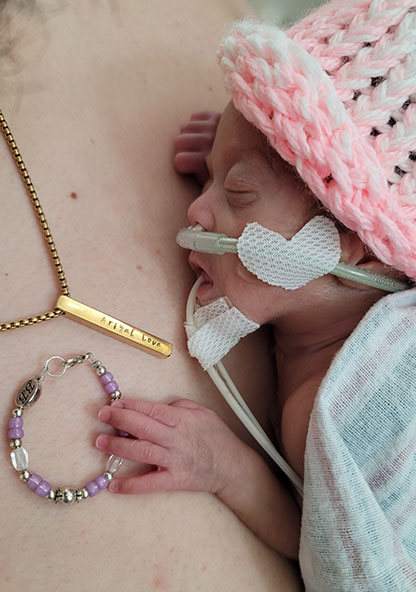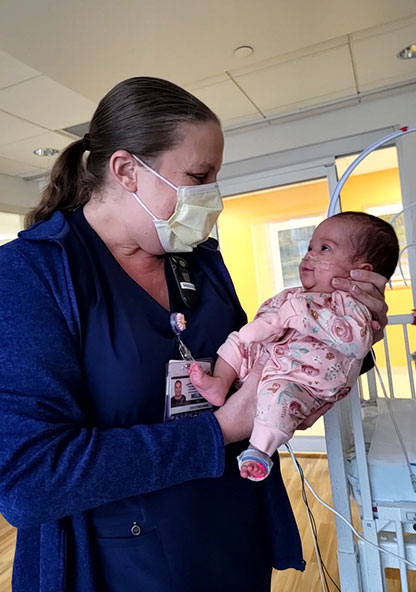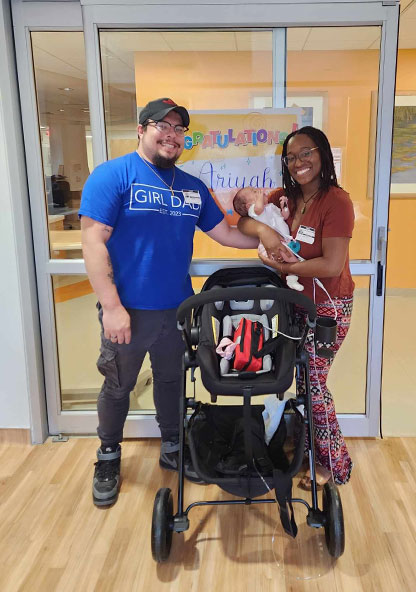Love's Strength: How CHRISTUS Children’s Helped First-time Parents Navigate the NICU

“In early January 2023, I was diagnosed with polycystic ovary syndrome, or PCOS, a hormonal disorder affecting fertility, and we had just begun to process that it may take some time for us to conceive,” Angel explained. “You can imagine how shocked I was when I found out I was pregnant just one week later!”
The exciting news was a much-needed bright spot in their lives, especially following the loss of both Angel and Brandunn’s grandmothers in 2021 and 2022.
“I lost my maternal grandmother, Catherine,” Angel said. “She was my last living grandparent, and we were especially close, so that made losing her that much harder. Even though I was excited about being pregnant, there was also this underlying sadness knowing that these two important people in my life would never meet.”
In April, Angel and Brandunn held a gender reveal for just the two of them and were surprised as they watched pink confetti cascade from a balloon.
“We were so sure it was a boy!” Angel said. “My sister and brother-in-law found out shortly after us that they were also expecting. Ironically, they were hoping for a girl and found out they were having a boy.”
For a few more weeks, Angel’s pregnancy proceeded without any issues. Then, in mid-May, she experienced some spotting, and contacted her OB-GYN who was able to see her later that day.
The Heart-Breaking News
“I remember that she had just begun the physical exam, when she gasped and backed away slightly,” Angel said. “She gently explained that I was already dilating and that my placenta looked ready to rupture. She said I needed to prepare for the possibility of losing the baby.”
Angel’s doctor referred her to CHRISTUS Children’s for a consultation with their maternal fetal medicine team, who provided her with a glimmer of hope.
“Because my placenta was still intact and labor hadn’t started, they wanted to try a cerclage procedure,” Angel explained. “Their primary concern was that there didn’t seem to be much cervical membrane to work with, but they were determined to do whatever it took to save my baby.”
Angel’s official diagnosis was cervical incompetence. Three doctors were involved in the cerclage procedure, which was deemed a success. At 21 weeks into her pregnancy, Angel was sent home with strict instructions for extensive bed rest, limited walking and no lifting. It was during the next few weeks that Angel encountered a new set of challenges.
“Most people are familiar with postpartum depression, but prenatal depression isn’t talked about as much,” Angel said. “For me, it was a combination of so many things. I was still grieving my grandmother, and I was worried about losing my baby. We started receiving gifts, and I bought a few baby items, but I found myself just staring at them. Not only was I physically limited in what I could do, but I felt uncertain about what to do with the baby items, because I didn’t know when the baby would come or if I would even have a baby to bring home.”
On Saturday, June 10, Angel experienced what appeared to be Braxton Hicks contractions, which sent her back to the hospital. Once admitted, she received fluids and medicine to help stop the contractions and delay labor. As a precaution, Angel was also given steroids to support the baby’s lung development in case of an early arrival. By Sunday evening, the medical team was hopeful Angel’s contractions would stop and that she could go home the next day. But, on Monday morning, shortly after Brandunn left for work, the medical team rushed into Angel’s room, abruptly waking her up.
“I felt some tightness throughout the night, but nothing strong,” Angel explained. “They came in because the baby’s heart rate had dropped. They said I might not have felt a contraction, but the baby did. They worked on me for a few minutes before they said it was time for an emergency C-section because they were worried about what would happen if her heart rate kept dropping.”
Brandunn rushed back to the hospital, and at 11:37 a.m. on June 12, baby girl Hernandez was born at 25 weeks, 3 days, weighing 1 pound, 13 ounces. Angel got a glimpse of her daughter just before she was rushed to the neonatal intensive care unit (NICU).
Their NICU Journey Begins
“I got to see her that night, but the moment is very hazy because I was still feeling the C-section medication effects,” Angel recalled. “I remember the beeping machines and seeing how small she was in the incubator. I kept thinking she has so much stuff on her. It was easy to feel overwhelmed, but I quickly learned how capable the Children’s NICU staff are, and their care really put me at ease.”
Just prior to Angel’s discharge home, she and Brandunn settled on a name for their daughter.
“Our due date was Sept. 22, so we were not prepared to pick a name in June,” Angel explained. “We had always kept a running list of names we liked from movies or books, so after she was born, we started narrowing the list to names that would be especially meaningful.”
During Angel and Brandunn’s next few visits to the NICU, they would say the names on their curated list aloud to see how their new baby girl would react.
“Anytime we said ‘Ariyah,’ she would turn her head or move her body,” Angel said. “The other names didn’t get the same reaction, so we took that as her signal that she liked that name. Ariyah means majestic and noble, which we felt embodied her strength. We had already chosen Love as her middle name, and it represents her softer, gentler side
In the weeks that followed, Angel and Brandunn spent as much time as possible with Ariyah Love. During the initial four weeks following Angel’s discharge, she was on pain medication and unable to drive. Brandunn would drop her off at the hospital on his way to work and pick her up on his way home. Angel spent her days in the NICU, where she practiced kangaroo care (skin-to-skin) with Ariyah, took time to rest, pumped breast milk, and continued to learn about caring for their little one.
“I remember one nurse named Melissa who was very adamant that I pump regularly to get my supply up,” Angel said. “I learned that she was a military veteran and had worked in the NICU for more than 20 years, so I knew that she knew her stuff, and her disciplined routine helped me get on track. I spent hours reading to understand the NICU – what the different machines were, the areas of expertise for the therapists and specialists rounding on Ariyah. I felt like I was back in school, trying to absorb all of the information I needed to understand her journey and my role in it.”
At the same time, Ariyah was making great progress as well. Their neonatologist, Dr. Cheryl Motta, was very optimistic about the baby’s development, but prepared Angel and Brandunn for Ariyah to be in the NICU through her original due date of Sept. 22.
“While Ariyah didn’t need to be intubated at birth, her oxygen levels were her biggest challenge,” Angel explained. “By August, she was able to transition from the c-pap machine to regular oxygen, but she would still have occasional drops in her oxygen saturation levels, which the team was working to stabilize as she got closer to her due date.”
At 32 term weeks, Angel and Ariyah were cleared for a 72-hour breastfeeding trial.
“It didn’t go well,” Angel recalled. “She was having trouble latching, and her oxygen levels kept dropping. They increased her oxygen and decided we should take a three-week break from breastfeeding. When we tried again, she did great, and we got a tentative discharge date of Aug. 25. Ariyah began to experience some reflux, which also affected her oxygen levels and delayed discharge, but she was able to continue nursing.”
With the CHRISTUS Children’s team focused on Ariyah’s goals, Angel and Brandunn prioritized their mental and physical health. Just a few weeks after Ariyah was born, Brandunn underwent an emergency appendectomy days before his 30th birthday.
“The added stress of trying to recover from his surgery while navigating Ariyah’s situation really took a toll on Brandunn,” Angel said. “He knew that he needed to put in effort to be the best version of himself during our NICU journey and for the transition home. And, if I hadn’t started proactively managing my mental health before Ariyah’s birth, I think our journey would have been much different. We’ve both learned that taking care of ourselves is the key to taking care of her.”
Finally, after 120 days in the NICU, Ariyah went home on Oct. 10.

To learn more about the neonatal intensive care unit (NICU) at CHRISTUS Children’s, please visit CHRISTUS Children’s | NICU (christushealth.org).

What is Cervical Incompetence?
Cervical incompetence is a medical condition where the cervix (the lower part of the uterus) weakens and becomes unable to support a pregnancy to full term. This can result in premature cervical dilation and early delivery, which can lead to miscarriage or preterm birth.
Symptoms to Watch out for:
- Pain or pressure in the pelvic area
- Vaginal discharge or bleeding during the second trimester of pregnancy
- Sensation of “something coming out” in the vagina.
Treatment Options:
Timely and appropriate intervention is essential to manage cervical incompetence and improve pregnancy outcomes. Several treatment options are available, including:
- Cervical cerclage: This procedure involves temporarily sewing the cervix closed with stitches to help the cervix hold a pregnancy in the uterus. It’s usually performed in the second trimester.
- Progesterone supplementation: Progesterone hormone therapy may be prescribed to help maintain the pregnancy and reduce the risk of complications including pre-term labor.
- Bedrest and activity restrictions: In some cases, doctors may recommend reduced physical activity and bed rest to minimize pressure on the cervix and prevent premature delivery.
Consultation with a Health Care Provider
If you experience any symptoms or have concerns about cervical incompetence during your pregnancy, it’s essential to seek immediate medical attention. A health care provider at CHRISTUS Children’s can evaluate your condition, recommend appropriate treatments, and provide personalized care to optimize your chances of a successful pregnancy and a healthy delivery.

